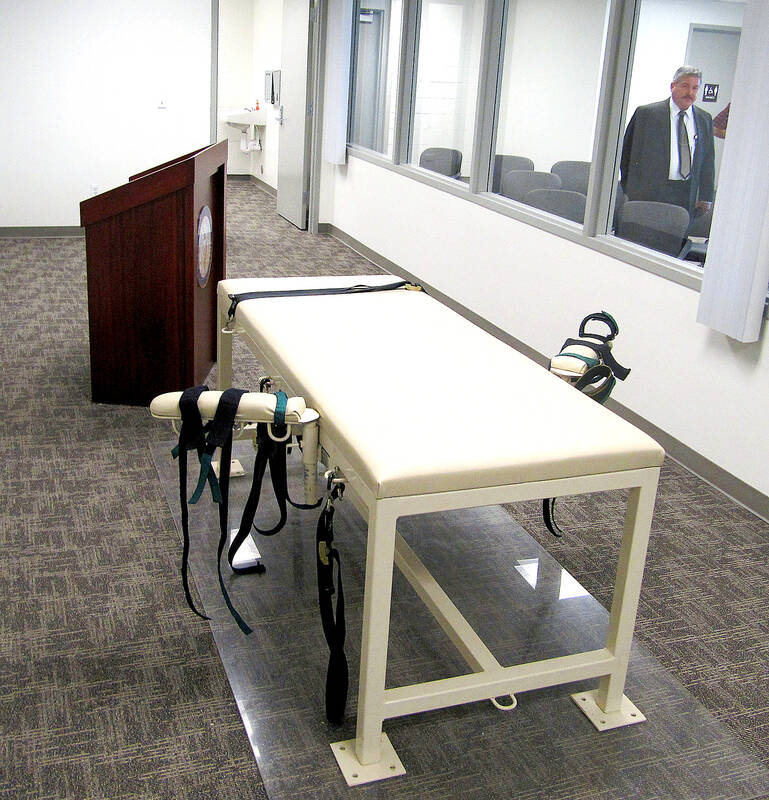The number of people known to have been executed last year was the highest in almost a decade, with Iran, Iraq and Saudi Arabia responsible for most executions, Amnesty International said yesterday.
A total of 1,518 executions were recorded worldwide last year, the most since 2015 when 1,634 people were killed, the rights group said in its annual report on death sentences.
The figures represent a 32 percent increase in known executions compared with 2023.

Photo: AP
They do not include thousands of people believed to have been executed in China — the world’s leading executioner — as well as in North Korea and Vietnam, Amnesty said.
“The death penalty is an abhorrent crime with no place in today’s world,” Amnesty secretary-general Agnes Callamard said.
The non-governmental organization found that for the second consecutive year the number of nations executing citizens remained the lowest on record at 15.
It said that Iran, Iraq and Saudi Arabia were responsible for 91 percent of known executions last year, with increases in death sentences in all three nations spurring the global rise.
“While secrecy continued to shroud scrutiny in some countries that we believe are responsible for thousands of executions, it’s evident that states that retain the death penalty are an isolated minority,” Callamard said.
Iran alone accounted for 64 percent of all known executions, executing at least 972 people, up more than 100 from the previous year.
Saudi Arabia, where beheading was used, doubled its annual total from 172 to at least 345, while Iraq almost quadrupled its executions from at least 16 to at least 63, Amnesty said.
The rights group said that some states were “weaponizing” the death penalty against protesters and ethnic groups.
It said Iran “persisted” in its use of death sentences to punish participants in the “Women, Life, Freedom” protests of 2022, including for a youngster with a mental disability.
Saudi Arabia continued to use the death penalty to silence political dissent and punish members of its Shiite minority, Amnesty added.
“Those who dare challenge authorities have faced the most cruel of punishments, particularly in Iran and Saudi Arabia, with the death penalty used to silence those brave enough to speak out,” Callamard said.
The group also noted that 25 people were executed in the US last year, up from one in 2023.
Amnesty said that drug-related offenses accounted for more than 40 percent of all executions globally, adding they were “prevalent” in China, Iran, Saudi Arabia and Singapore.
It added that humanitarian law deems such executions unlawful because drug offenses should not be deemed one of the “most serious crimes.”
Amnesty said that the Maldives, Nigeria and Tonga are considering introducing capital punishment for drug-related offenses, while the Democratic Republic of the Congo and Burkina Faso have announced plans to bring back executions for ordinary crimes.
At present 145 nations have either outlawed the death penalty or no longer use it, the rights group said.

VAGUE: The criteria of the amnesty remain unclear, but it would cover political violence from 1999 to today, and those convicted of murder or drug trafficking would not qualify Venezuelan Acting President Delcy Rodriguez on Friday announced an amnesty bill that could lead to the release of hundreds of prisoners, including opposition leaders, journalists and human rights activists detained for political reasons. The measure had long been sought by the US-backed opposition. It is the latest concession Rodriguez has made since taking the reins of the country on Jan. 3 after the brazen seizure of then-Venezuelan president Nicolas Maduro. Rodriguez told a gathering of justices, magistrates, ministers, military brass and other government leaders that the ruling party-controlled Venezuelan National Assembly would take up the bill with urgency. Rodriguez also announced the shutdown

Civil society leaders and members of a left-wing coalition yesterday filed impeachment complaints against Philippine Vice President Sara Duterte, restarting a process sidelined by the Supreme Court last year. Both cases accuse Duterte of misusing public funds during her term as education secretary, while one revives allegations that she threatened to assassinate former ally Philippine President Ferdinand Marcos Jr. The filings come on the same day that a committee in the House of Representatives was to begin hearings into impeachment complaints against Marcos, accused of corruption tied to a spiraling scandal over bogus flood control projects. Under the constitution, an impeachment by the

Exiled Tibetans began a unique global election yesterday for a government representing a homeland many have never seen, as part of a democratic exercise voters say carries great weight. From red-robed Buddhist monks in the snowy Himalayas, to political exiles in megacities across South Asia, to refugees in Australia, Europe and North America, voting takes place in 27 countries — but not China. “Elections ... show that the struggle for Tibet’s freedom and independence continues from generation to generation,” said candidate Gyaltsen Chokye, 33, who is based in the Indian hill-town of Dharamsala, headquarters of the government-in-exile, the Central Tibetan Administration (CTA). It

China executed 11 people linked to Myanmar criminal gangs, including “key members” of telecom scam operations, state media reported yesterday, as Beijing toughens its response to the sprawling, transnational industry. Fraud compounds where scammers lure Internet users into fake romantic relationships and cryptocurrency investments have flourished across Southeast Asia, including in Myanmar. Initially largely targeting Chinese speakers, the criminal groups behind the compounds have expanded operations into multiple languages to steal from victims around the world. Those conducting the scams are sometimes willing con artists, and other times trafficked foreign nationals forced to work. In the past few years, Beijing has stepped up cooperation